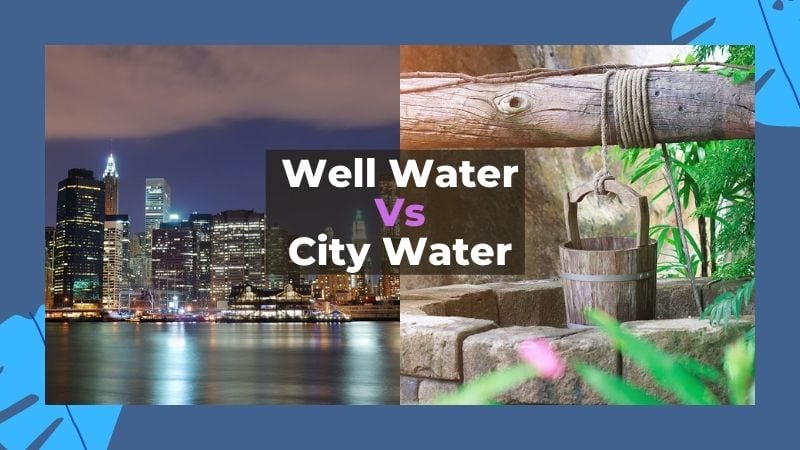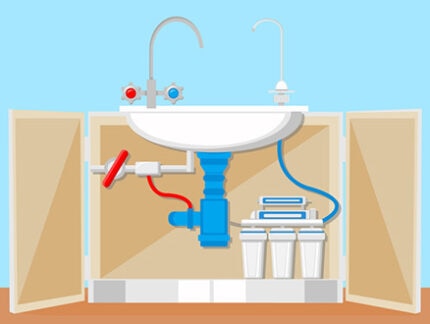The water source is one key point to consider when house-hunting – well water or city water. The well water vs city water argument has been around for a while now. It does not even look like it will be ending any time soon. Either side of the discussion has points to back up their stance. There are even some people who use both water sources depending on the situation.
This article is considering the age-long city water vs. well water argument. You will learn the pros and cons of well water and city water. And you’ll be able to make a better-informed decision when you need to.

Overview of Well Water
As a homeowner, you can source your water from a privately owned well on your property. You may use such water for drinking, cooking, bathing, and other domestic purposes. You get a well by digging or drilling into the soil to obtain underground water.
The water goes to a natural filtration system as it flows through layers of sand and rocks. The water is also well away from the polluted surface water. It does not mean the water is absolutely clean, but it does good enough. Well water is a more commonly found water source in undeveloped or developing areas when compared with big well-planned cities.
The water is more mineralized than the city water – high calcium and magnesium content – and might require softening. This is because hard water does not lather well with soaps and detergents. It can also lead to some calcium and magnesium compounds’ deposition or even react with the pipes.
It is also possible for septic tanks, chemicals, micro-organisms, and other pollutants to seep into your well water. This is why it is imperative that you carry out routine tests and treatment on the water. This makes sure you do not suffer poisoning from micro-organisms, heavy metals, or other chemicals.
Pros
1. Well water is mineralized
This comes as an advantage because it makes the water taste better than soft water. Also, these minerals are essential nutrients that keep you in good health. Some of these minerals are good for the development and growth of children.
2. The water is clean and fresh
Well, the water source is an underground aquifer – below the polluted surface run-offs. Running through layers of soil and rocks, you obtain clean water. It is usually untainted by surface water and pollutants.
3. You won’t need to pay for water
This is one of the most considered factors when talking about well water vs city water. You do not expect to get a water bill when you are using privately owned well water. This is not the case with city water, where you will be expected to pay a monthly water bill to the corporation. And if you cannot keep up with the bills, you will be cut off the water supply.
4. It is not affected by floods
Unlike city water that is obtained from the river, flooding does not contaminate well water. Due to contamination of water bodies during incidences like flooding, city water providers often have challenges in distributing water to the houses that depend on them. Unless the situation is pretty bad, your well water will not be contaminated.
5. It is environmental-friendly
One of the benefits of well water as your water source is that it is an environmental-friendly option. This is because you do not have to use harsh chemicals as it is naturally filtered. The water does not contain toxic waste from insecticides, fertilizers, the company’s chemical waste, and the likes.
6. Increases the value of your property
Having a well on your property increases its worth. In many places, you could gain some tax credit for owning a well on your property. This saves you a considerable amount and could count as an investment.
Cons
1. You are responsible for anything that goes wrong
It is not the water corporation’s business if anything goes wrong with your well water. You take sole responsibility for maintaining, testing, and treating the water if there is a need. If the well dries up, you also have to take care of it on your own. This might make you incur additional costs for extra drilling or repairs.
If you use well water, you have to pump the water to an overhead tank. This requires electricity and adds to your energy consumption. You can have a water crisis if the water pump breaks down or there is a prolonged power outage.
2. It is most often hard water
Mineralized water might have some health benefits. But there are also concerns about how much detergent you need before it lathers. Also, hard water reacts with your plumbing – pipes, and fixtures – leaving difficult stains and damages necessitating repairs. It costs extra money to soften the water and repair the damages.
Overview of City Water
The commonest water source in the municipals is the city water supplied by the local authorities or a water corporation. This is why it is also called municipal water. The water is sourced from freshwater bodies (lakes, streams, rivers, or even wells). It requires you to cover a bill at regular intervals – usually monthly.
The water collected goes through some processes, including, but not limited to, coagulation, flocculation, sedimentation, and chlorination. These processes neutralize negatively charged particles in the water and purify it. It also gets rid of harmful micro-organisms. The water is channeled to houses through underground water mains.
Pros
1. You are only responsible for the bills
You do not have to worry much about how the water gets to you. The right authorities are in total control once you keep up with the bills. You are unbothered by whatever goes wrong at the processing plant or water mains. Aside from whatever discomfort during the period, the authority is left with the financial burden of the repairs, maintenance, tests, and treatments.
2. You do not need an additional filtering process
As long as you trust your water supply authority, you do not have to make additional arrangements for treating or testing the water. The water authorities handle the series of processes that ensure the water is safe for consumption.
3. It is not hard water
There is no need to worry about city water staining or damaging your plumbing fixtures. Or having to use so much soap before it lathers. If the source water is hard, the processing softens the water before it gets to you.
4. It is reliable
City water is often more reliable than well water because you are not worried about the well drying up or the water pump getting spoilt. If something goes wrong with the city water, the authorities have the financial means and human resources to get it up and run in no time. The water management will go to any length to make sure water is always available.
In addition, the city stores water in huge reservoirs. This allows them to supply water for some time when there is a problem till it is sorted. You might not enjoy that luxury if you use well water.
5. It comes with more pressure
Who likes a tap that doesn’t run fast enough? City water comes out from your tap with relatively more pressure than well water. The water comes with a higher force from the storage tanks. Many buildings have a pressure-reducing valve that regulates water pressure. This might not be the case with well water, especially if you live in more than a story-building or your apartment is on a high floor.
6. It is the preferable option in some locations
It will be a futile effort to drill a well in some areas because of the topography or soil type. Some places have too many rocks that might be difficult to get through to get water. To avoid spending too much money, it is more reasonable to opt for municipal water.
Also, some places experience long periods of drought or are prone to water scarcity, especially during the dry season. During this time, your well water might dry up. It is better to opt for city water in such a case. The authorities may find a more reliable water source to cater to the people.
Cons
1. It is not under your control
While it makes sense that you do not bear the brunt of the water supply’s responsibility, you also do not have control over it. Most importantly, you do not have a say in the purification process. If you do not like the chlorine or whatever disinfectant is used, you just have to take it like that. At best, you can find mechanisms to remove it on your own.
Also, the water gets to your house through a pipe that might have been laid before you were born. Some of these pipes are still made of lead. Lead could seep into your water, which is a health risk. Again, you do not have control over the type of pipe used to channel the water.
2. You have to pay monthly water bills
To continue enjoying water from the authorities, you have to keep up with the bill. This is a considerable addition to your monthly expenses. At the end of the month, it culminates into a notable drain in your income.
On the other hand, you cannot afford to accumulate unpaid bills. The authorities could decide to cut off the water supply to your house. The more you use, the more you pay. This is a concern if you live in a house with many bathrooms or have a not prudent family with their water consumption.
Wrapping Up: Well Water vs City Water
As you can see, each side to this well water vs city water dilemma has its own pros and cons. Deciding on what to go with largely depends on what is most convenient for you. You may request from those in the neighborhood to ascertain what has worked better for them.
With the differences, pros, and cons of well water and city water we have highlighted, we believe you can now make a better-informed decision on which one to go for.











